Jennifer Amarachi Maduwuba. Freelance Health Writer and DLHA Volunteer. Medically reviewed by the DLHA Team.
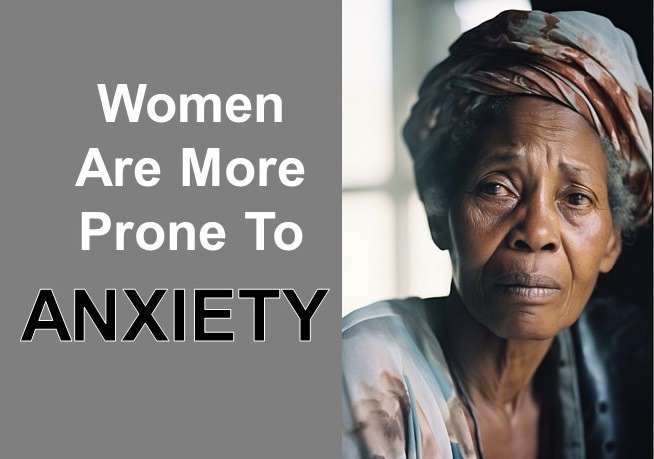
Women are more prone to anxiety. Image credit: Freepik
Anxiety is a common emotion which is usually accompanied with a feeling of fear, worry and apprehension for the unknown. Many times, it comes with bodily manifestations like nervousness, restlessness, increased heart rate, increased blood pressure, rapid breathing, sweating and shakiness. It's usually a natural reaction to uncertainty or fear.
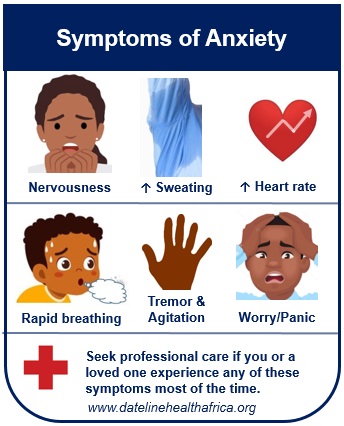
Symptoms of anxiety
Most times, anxious feelings don't come as a result of bad events, it can be as a result of big events or activities in your life or starting or trying out something for the first time.
In this blog, I will be discussing in no particular order, 11 ways that you as an African can prevent anxiety from taking control of your life.
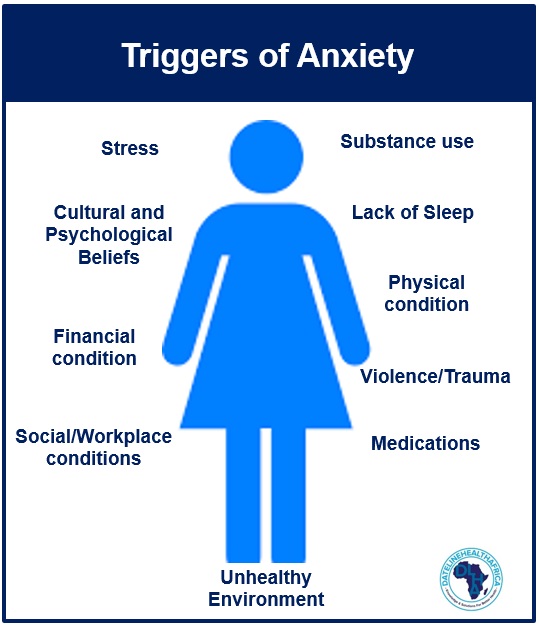
Anxiety triggers. Click on image to enlarge.
Identifying your triggers can help you prevent anxiety because it creates awareness of what may cause the anxiety. Triggers include such things as people, places or situations that get you worried or stressed.
Knowing them allows you to develop ways to better cope with them.
If you can’t avoid the triggers, you can prepare for them or learn coping skills like deep breathing, and calming exercises that will help you stay calm when the triggers occur.
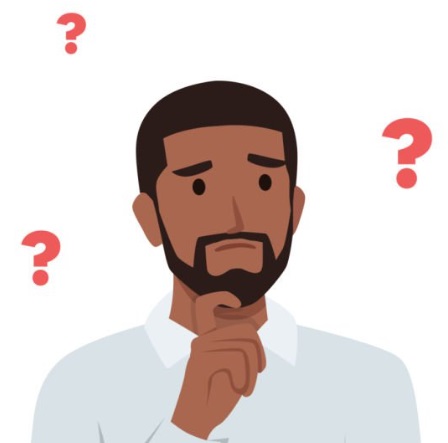
Questioning unhelpful thoughts and focusing on what you can control allay anxiety.
This helps you prevent anxiety because it stops the development of worries. When you find yourself thinking negatively, ask yourself what justifies the thought.
You feel less anxious when you replace unhelpful thoughts with more positive or realistic ones. If need be, question the worst case scenario and finally, focus on what you can control.
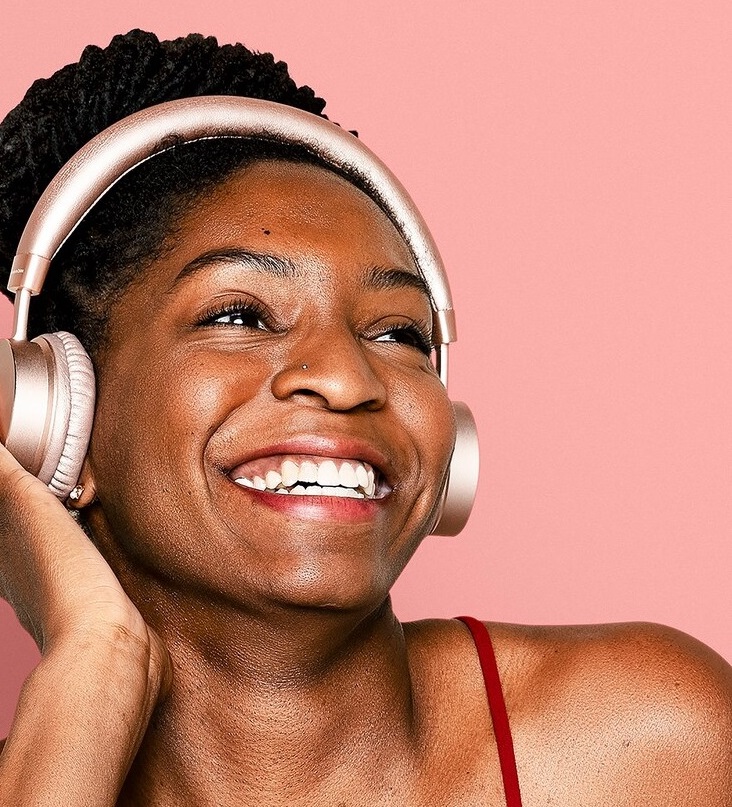
Listening to music may serve as self-distraction in prevention of anxiety. Image credit: rawpixel,com on Freepik
Self-distractions prevent anxiety by simply diverting your attention away from stressful thoughts and worries.
When anxious feelings arise, remove your focus and attention from things that cause anxiety.
You can listen to music, watch a movie, paint, or take a stroll or participate in activities that will keep your mind busy.
These distractions help you prevent anxiety by giving your mind a break.
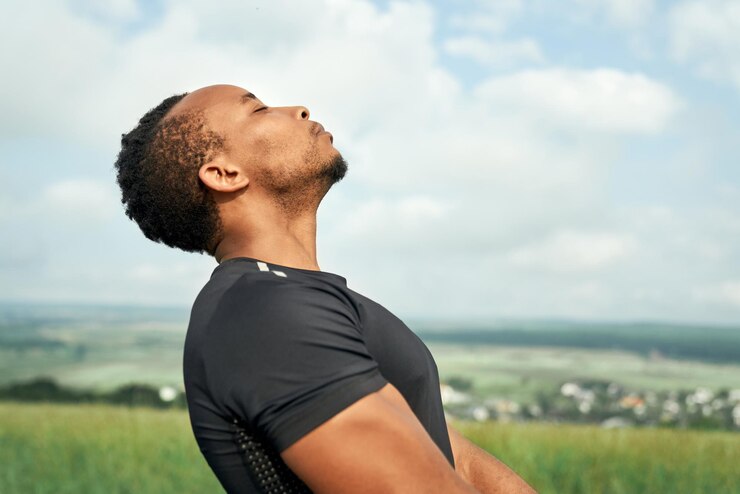
African man practising deep breathing outdoor. Image credit: ArtPhoto_studio on Freepik
With the reduction of stress, your body produces less cortisol, a hormone that heightens anxiety.
Less cortisol will keep your mind and body relaxed. Less stress help you be calm, and think clearly. This prevents feelings of being overwhelmed.
You can reduce stress effectively by practicing relaxation techniques like deep breathing, and meditation.
Having regular amount of exercise, eating healthy (include more fruits and vegetables to your diet), getting enough sleep, and making out time to socialize with people also help to ease off stress.
.jpg)
Exercise is a remedy for anxiety
Exercise is a great remedy for almost every health condition especially in the right recommended amount; hence one of the ways to prevent anxiety.
Regular exercise is associated with general well-being and helps to lower mood and anxiety disorders.
The World Health Organization (WHO) recommends at least 150 to 300 minutes of moderate aerobic activity per week (or the equivalent of vigorous activity) for all adults, and an average of 60 minutes of moderate aerobic physical activity per day for children and adolescents.
It increases blood and oxygen flow to your brain, this increases the release of feel-good hormones that elevate your mood and also help calm your mind hence helping prevent anxiety.
Healthy eating aids prevention of anxiety. Click on image to enlarge.
Healthy eating ensures your body is well nourished to function well.
Research has shown an association between reduced anxiety and more fruits, vegetables, omega 3 fatty acids, healthy dietary patterns, caloric restrictions, breakfast consumption, micronutrients supplementation, zinc, magnesium and selenium.
Complex carbohydrates are metabolized more slowly and therefore help you maintain an even blood sugar level, which creates a calmer feeling and prevents anxiety.
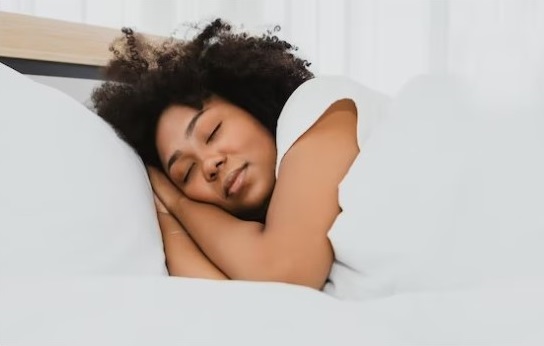
Sleeping restores and helps to prevent anxiety
While anxiety can make it difficult for you to fall and stay asleep, sleeping helps prevent anxiety as it restores and calms your body.
It improves your mood, concentration, judgment, and decision-making ability.
Sleep allows your brain and body to slow down and engage in processes of recovery, promoting better physical and mental performance the next day and over the long-term.
When you get a good night's rest, your body naturally reduces the levels of cortisol and other hormones that help to reduce stress, all preventing the development of anxiety.
Research shows that a chronic lack of sleep, or getting poor quality sleep, increases your risk of health problems like high blood pressure, cardiovascular disease, diabetes, depression, and obesity. All these conditions can create room for fear and anxiety.
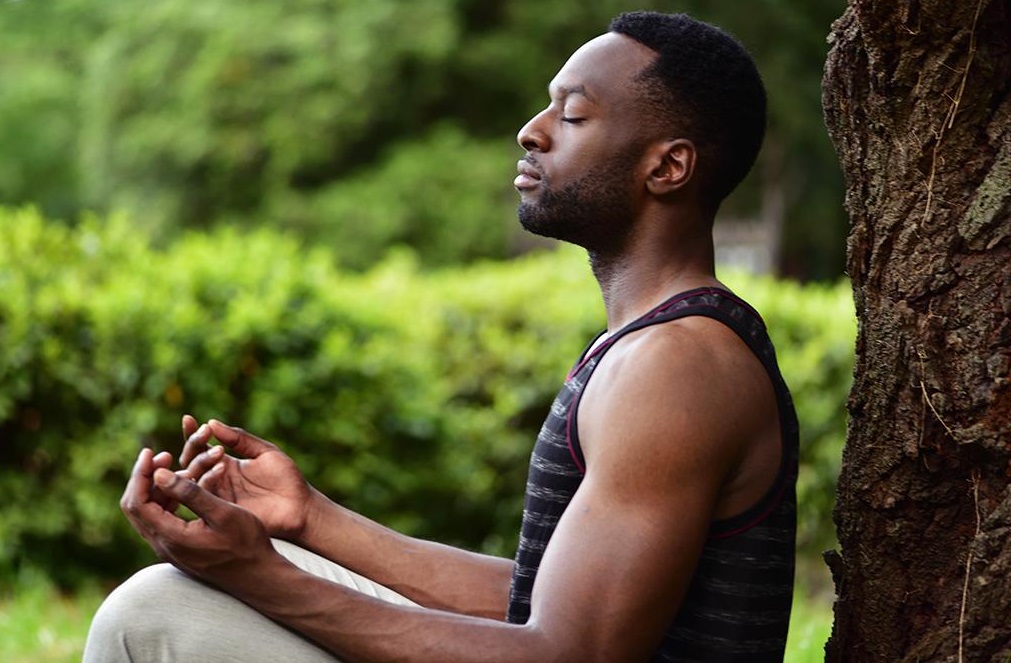
Meditation prevents anxiety. Image Credit
It means fixing your mind on a particular thought for some time.
It helps prevent anxiety by focusing your mind on one thought and getting rid of streams of unneeded thoughts that produce fear.
Meditation increases levels of certain neurotransmitters in the brain that promote relaxation, calm and reduce anxiety symptoms.
Also, meditation has consistently been shown to reduce cortisol and catecholamine level (such as epinephrine and norepinephrine) that may otherwise trigger anxious responses.

Avoid or cut alcohol and caffeine use
Initial intake of alcohol may help you relax, however, this changes with increased intake.
Little intake stimulates GABA (Gamma-Aminobutyric Acid) a neurotransmitter that promotes relaxation. But with increased intake, it depletes the neurotransmitter. This can cause a feeling of depression, stress and fear.
Apart from its effect on GABA, chronic alcohol use may cause imbalance in other neurotransmitters like dopamine and serotonin and hormones like cortisol, thereby diminishing your ability to respond to stress in healthy and effective ways, which can lead to anxiety
Caffeine is a stimulant that affects the central nervous system, so consuming caffeinated beverages, such as coffee and tea, stimulates the central nervous system causing the body to produce and release adrenaline. This can cause you to feel anxious or nervous.
So, to prevent anxiety, you will do well to reduce your alcohol and caffeine use.
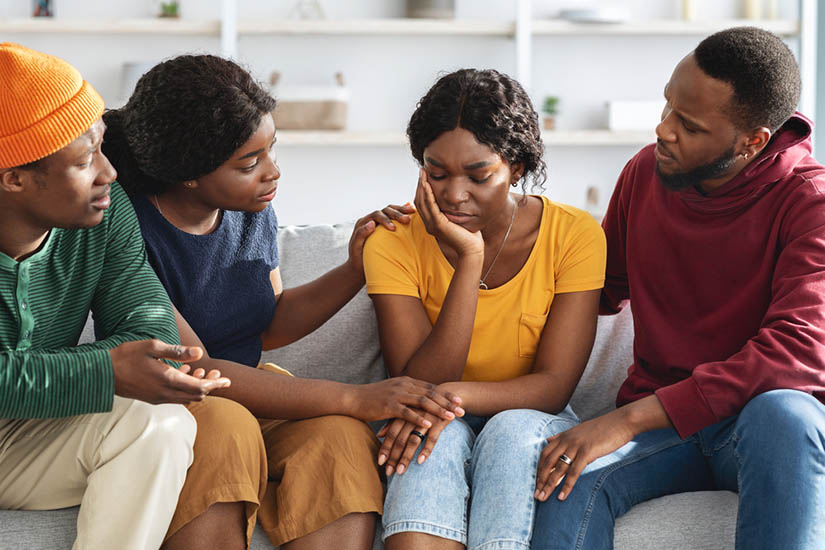
Social support is important in coping with anxiety. Credit
Having a supportive individual, and/or community that listens and shows empathy can help you deal with emotional states.
Discussing your concerns and fears with your support network creates a feeling of belonging and acceptance, which curbs the feeling of loneliness that leads to anxiety.
Also, your support network can bring or contribute practical solutions to your concerns, which in turn may help prevent your anxiety.
Supportive friends or family can also encourage you to participate in activities or exercise, healthy eating, and getting enough rest; all of which can help prevent anxiety.

Hobbies can help prevent anxiety
Hobbies can help you prevent anxiety to a great extent by providing an outlet for stress, promoting relaxation, and enhancing mental well-being.
By diverting your attention from worries and fears, hobbies help you escape the situation that frequently fuels anxiety.
Group hobbies like book clubs, sports teams, or craft making clubs also provide social support and counter isolation.
Anxiety is a normal emotional response to stress and uncertainty, but it can be prevented through intentional lifestyle modifications and practices. Engaging in these actions are ways to proactively prevent anxiety and maintain good mental and physical health.
Aucoin M, LaChance L, Naidoo U, Remy D, Shekdar T, Sayar N, Cardozo V, Rawana T, Chan I, Cooley K. Diet and Anxiety: A Scoping Review. Nutrients. 2021 Dec 10;13(12):4418. doi: 10.3390/nu13124418. Available from here.
Chen KW, Berger CC, Manheimer E, Forde D, Magidson J, Dachman L, Lejuez CW. Meditative therapies for reducing anxiety: a systematic review and meta-analysis of randomized controlled trials. Depressed Anxiety. 2012 Jul;29(7):545-62. doi: 10.1002/da.21964. Available from here
Mosel, S. Alcohol and anxiety: Does alcohol cause anxiety and panic attacks? [Internet]. Updated August 16, 2024. American Addiction Centers. [Cited December 5, 2024]. Available from here.
World Health Organization. Guidelines on physical activity and sedentary behaviour. [Internet]. 4 May 2021. {Cited December 5, 2024]. Available from here.
Published: December 9, 2024
© 2024. Datelinehealth Africa Inc. All rights reserved.
Permission is given to copy, use and share content freely for non-commercial purposes without alteration or modification and subject to source attribution
DATELINEHEALTH AFRICA INC., is a digital publisher for informational and educational purposes and does not offer personal medical care and advice. If you have a medical problem needing routine or emergency attention, call your doctor or local emergency services immediately, or visit the nearest emergency room or the nearest hospital. You should consult your professional healthcare provider before starting any nutrition, diet, exercise, fitness, medical or wellness program mentioned or referenced in the DatelinehealthAfrica website. Click here for more disclaimer notice.